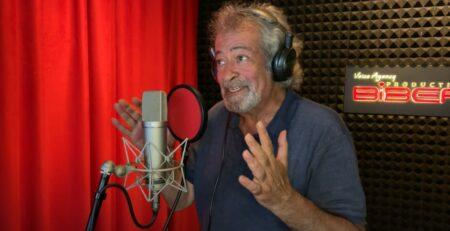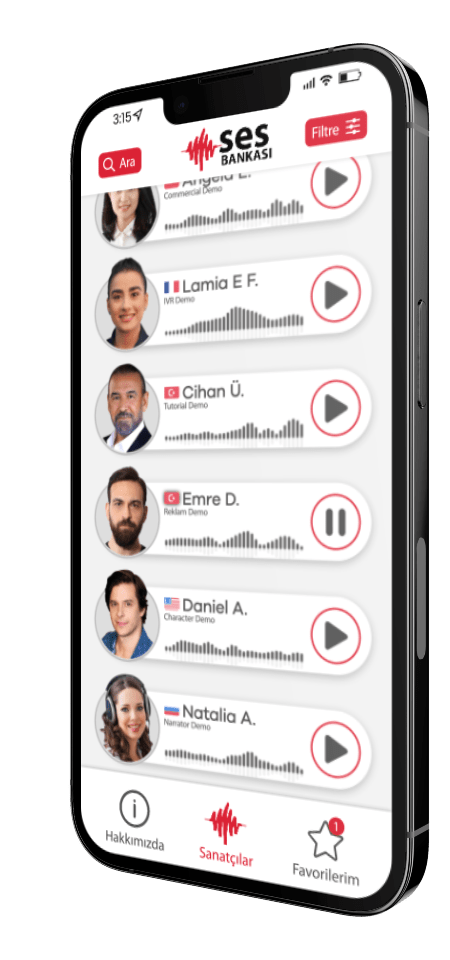What is Voice Over? Things to Consider While Making Voice Over
What is voiceover, what is dubbing? These two terms are completely separated from each other with a slight difference. Therefore, the works of voice actors and dubbing artists are also different. So what is voiceover then? What are the differences between dubbing and dubbing?
What are the Differences Between Voice Over and Dubbing?
In dubbing and dubbing, the work artists do is known as speaking to an image, so it's natural to be confused. However, they should be differentiated according to the project content they will talk about.
What is voiceover: Also known as off-camera or off-stage commentary. It is a production technique in which a voice is used in radio, television production, film production, theater without a character equivalent. If we give an example of the voice-over works that we are exposed to in many moments of our lives today, we can first talk about advertisements in audio and visual broadcasting channels. Voices that make campaign announcements or inform their customers about innovations by reading the texts of the advertisements about the brand, product or service that are the subject of the advertisements. In these advertisements, the speaker does not have any character equivalents, only their voices are heard. Or station announcements made in subways and switchboard announcements used in customer services are also good examples of voice-over works that are constantly in our lives.
What is dubbing: It is the technique of speaking the local language again for the characters that have been spoken in another language before, or the technique of giving a voice to a character that is sometimes voiced in Turkish but not liked. While dubbing is not possible due to the language difference in foreign productions, it is very important to keep the lip synchronization while dubbing in Turkish.
If we talk about the other differences apart from these; In dubbing, theatrical abilities should come to the fore in order to perform the play of the character on the screen exactly, while theatricality, correct intonation and emphasis, characteristic voices should be at the forefront as a whole. Because it is not easy to make the listener feel the emotion of the text without any image or sound. For this reason, while only voice actors can do the dubbing, both dubbing artists and voice actors can easily do it.
What are the Points to Consider While Making Voice Over?
While giving voiceover, the voice talent in front of the microphone must comply with certain vocalization rules. So what are these voiceover rules?
First of all, the artist should do the text analysis well. He should understand the emotion of the text well and read with emphasis and intonation according to the emotion. For example, if the text to be voiced is a documentary text containing hunting scenes, the artist reading this text should use a strong, determined and energetic tone during the hunt, while using a victorious voice for the hunter after the hunt, but a sad voice for the prey so that he can capture the naturalness and the feeling of the scene. can transfer. This change in sounds can only be made with the right emphasis and intonation.
Diction is another important rule for voice actors to pay attention to. No matter how successful the transfer of emotion with the right emphasis and intonation is, a reading style with articulation disorder will be extremely uncomfortable for the listeners. In addition, the texts of the projects with timing constraints require fast reading and it is more difficult to catch fluency and not disrupt the articulation in the texts that will be read quickly. For this reason, artists should regularly eliminate articulation disorders with exercises that will develop facial and tongue muscles. We especially recommend reading rhymes among the exercises that develop the tongue muscle. The more repetitions, the better diction.
Another consideration is the use of diaphragm and head voice. Voice actors should make the best use of their diaphragm and head voice when performing. It is technically more appropriate to use the head voice in texts with shorter sentences and the diaphragm in texts with long sentences. When these techniques are combined with a correct diction, it will be much easier to make a voiceover in accordance with the spirit of the text.
Considering that each voice actor has a certain voice color and style, the voiceover director usually determines the task of choosing a voice actor suitable for the spirit of the text. The selected voice actor should also be able to work in harmony with the voiceover director who will manage the project to be worked on. Because the directors are the people who know the details of the project and generally talk to the customer about their expectations, they can guide the artist in line with the customer's wishes, and thus satisfaction is higher. There are also experienced voice actors in the market who do not need a sound director. However, one of the advantages of the sound director is to have simultaneous corrections for mistakes made as a voice listening to the works from the outside, thus shortening the working time of the artist. For this reason, artists and agencies generally prefer to work with a director.
To summarize here:
The First Stage of Considerations for Voice Over: Text Preparation and Reading Clarity
Text preparation forms the basis of voice-over performance. The text should be pre-arranged, written clearly and fluently. Sentences and words in the text should be emphasized correctly, emphasis and intonation should be used to better express the meaning of the text when necessary. A correct text preparation should be made for voice-over. The text should be arranged so that it can be read clearly and the parts that need to be emphasized should be specified. It is important to read and understand the text in advance and read it naturally.
Text preparation and reading clarity are important factors that affect the quality of the voiceover. Well-prepared text and clear reading increase its intelligibility and impact. This gives the listener a more professional and high-quality voiceover experience. In this regard, it is generallymatch director accompanied by reading rehearsals.
Reading clarity is about speaking the text accurately and clearly. Correct diction, pronunciation and use of emphasis are important. Pronunciation of words clearly, correct intonation and rhythmic reading help the listener to better understand the text. At the same time, while reading the text, unnecessary pauses should be avoided and smooth fluency should be ensured.
Second Stage Voice Control
Using and controlling the sound correctly is the most important rule of vocalization. Reading the text naturally, paying attention to factors such as tone of voice, emphasis, speed and rhythm is critical for conveying the emotion in the text. Expressing the voice by projecting appropriately and using emotional intonations means voice control, and voice control is essential to the success of the voiceover. It affects the sound quality of the volume control in the following ways:
- Power and Fullness of Sound: Good volume control ensures that the sound is powerful and full. With the right breathing techniques and the reproduction of the sound in the right positions, the sound can be conveyed in a more expressive and emphatic way.
- Clarity of Voice: Voice control ensures that the voice is clear and intelligible. Text is better understood by correctly guiding, stressing and pronouncing the sound.
- Intonation and Stress: Volume control enables the use of correct intonation and emphasis. Emphasizing important points in the text, establishing an emotional connection with the right intonation and creating a rhythm suitable for the text increase the quality of the vocalization.
- Mute and Pause: Volume control plays an important role in muting and pausing. Pausing at the right points in the text, breathing and creating silence when necessary, emphasizes the meaning of the text and allows the listener to process the text better.
- Controlled Use of Sound: Sound control allows the sound to be used in the desired way. Correctly adjusting the volume, intensity and tone of the voice is important to reflect the emotional content of the text and convey the right message.
A good volume control makes your voiceover performance professional and impressive. Proper use of elements such as strength, clarity, intonation and emphasis help you to voice the text in a more understandable, fluent and expressive way.
Third Stage Microphone Technique and Sound Recording
Microphone use and technique are important. Attention should be paid to details such as approaching the microphone at the right angle, using a pop filter to reduce popping sounds. In order for the sound recording to be clean and professional, it is necessary to work with a voice director and technical infrastructure. Microphone technique and sound recording directly affect the quality of the voiceover. Good microphone technique and accurate sound recording ensure that the sound is delivered in a clear, clean and professional manner. The right microphone technician is important for:
- Audio Capture: Microphone technique and audio recording ensure accurate audio capture. Using the microphone in the correct position and angle ensures the best recording of sound.
- Clarity and Clearness of Voice: Microphone technique and sound recording ensure the sound is clear and clean. Appropriate microphone and recording media should be selected to prevent unwanted noise coming from outside, to minimize background noise and to reduce echo.
- Balance and Equality of Sound: Microphone technique and sound recording ensure that the sound is recorded in a balanced and even way. Accurately capturing the different frequencies of the sound ensures that all tones of the sound are heard equally.
- Microphone Effects: Microphone technique and sound recording also includes effects and adjustments using the microphone. Factors such as special effects, reverb, reverb time and additional sound processing techniques determine the character and atmosphere of the sound.
- Sound Recording Control: Microphone technique and sound recording require constant supervision during recording. Correct adjustment of the volume and correct positioning of the microphone and recorder affect the quality and clarity of the sound.
A good microphone technique and accurate sound recording make your vocal performance more professional and impressive. Accurately capturing and recording elements such as clarity, cleanliness, balance and evenness of the sound gives listeners a higher quality sound experience.
Things to Consider While Performing Voiceover Fourth Stage Breathing Technique
It is important to use correct breathing techniques. Being quiet and controlled while breathing ensures a stronger sound with correct breathing techniques and an uninterrupted recording. Continuous recording means a quality tape.
The breathing technique directly affects the vocal quality. Good breathing technique ensures that the sound is powerful, controllable and sustainable:
- Power and Fullness of Voice: Correct breathing techniques ensure that the voice is powerful and full. Breathing deeply and using the abdominal muscles allows the voice to be supported by more air and helps the voice to come out stronger.
- Durability of Sound: Good breathing technique increases the durability of sound. Proper use of breathing ensures that the voice remains strong and stable, even in texts that require long-term performance.
- Control of Voice: Breathing techniques provide control of voice. Breathing in and out at the right time helps to better express the emphasis and intonation in the text.
- Rhythm of the Voice: The breathing technique allows the use of sound in a rhythmic way. Synchronizing the breath with the right timing and rhythm makes it easy to catch the right fluency and rhythm in the text.
- Relieve Voice Fatigue and Stress: A good breathing technique reduces voice fatigue and relieves stress. Breathing deeply and checking the breathing regularly provides more oxygen to the vocal cords and reduces the negative effects of stress on the voice.
Breathing technique is an important element that improves your vocal performance. Proper breathing makes the sound powerful, controllable and durable. This means better expressing text and giving listeners a more immersive audio experience.
Fifth Stage Diction and Pronunciation
It is necessary to pronounce words correctly and express them clearly. Whether it is dubbing or dubbing, it is necessary to use a clear Turkish or related language. For this reason, a voice actor needs to know all the subtleties of the language. In addition, correct diction and pronunciation directly affect the quality of the vocalization. Good diction and correct pronunciation make the text more understandable, fluent and impressive.
- Clarity: Good diction and correct pronunciation make the text more understandable. Pronouncing vowels clearly, correctly stressing words, and properly separating syllables allow the listener to better understand the text.
- Expressive Power: Diction and pronunciation increase the expressive power of the text. Correct emphasis, intonation and rhythmic reading ensure better conveyance of emotional content in the text. Accurately making the emotion, emphasis and emphasis required by the text gives the listener a more immersive sound experience.
- Professionalism: Good diction and correct pronunciation are important for a professional vocal performance. Proper use of sound, correct pronunciation of words and fluent textual sounding give the listener a professional impression.
- Foreign Language Voices: Diction and pronunciation are especially important in foreign language voiceovers. Correct pronunciation ensures correct understanding of the foreign language text, and using the correct accent makes the text sound more natural and fluent.
Diction and pronunciation are important elements that improve your vocal performance. It allows the text to be voiced in a more understandable, impressive and professional way. Good diction and correct pronunciation give listeners a higher quality audio experience and increase the impact of the text.
Things to Consider While Performing Voice Over Stage Six Emotional Connection
It is important to try to make an emotional connection rather than just reading the text. Understanding the meaning and content of the text, it is necessary to accurately express the mood of the character or text. This can only happen with teamwork. The more compatible the voice-over director and the voice-over or dubbing artist are, the higher the quality of the project. Because the voiceover director will make the necessary directions for the emotional connection, which is mentioned as an outside eye and most importantly experience. Emotional connection affects voice quality by:
- Emotional Expression: A good emotional connection allows to express the emotional aspects of the text more effectively. Correctly using emotional emphases in the text better conveys the emotional experience of the text to the listener.
- Empathy: Emotional connection provides a bond with the listener. Empathizing with the emotional states of the characters or the story in the text and reflecting it in the voiceover makes the listener more connected to the text.
- Intonation: Emotional connection works with intonation. Accurately capturing emotional transitions and tonal changes in the text increases the emotional depth and variety of the text.
- Storytelling: Emotional connection plays an important role in storytelling. Accurately conveying the events, characters and emotional process in the text increases the impressiveness and power of the story.
- Impact on the Listener: Emotional connection aims to make an impact on the listener. Accurately conveying emotional aspects in the text can evoke an emotional response in the listener and increase the impact of the text.
Emotional connection makes your vocal performance deeper and more expressive. Accurately capturing the emotional aspects of the text connects the listener to the text and gives them a richer audio experience. A good emotional connection allows you to voice the text more strongly and effectively.
Things to Consider While Performing Voice Over Stage Seven Voice Over / Voice Exercises and Training
It is important to regularly do voice exercises and attend trainings in order to improve vocalization skills and even maintain existing talent. Regular vocalization exercises and training have positive effects on voice control, flexibility and performance:
- Voice Control: Voiceover exercises and training improve voice control. Working on different intonation, emphasis, rhythm and loudness allows the sound to be used in the desired way.
- Flexibility and Variety: Vocalization exercises and training increase the flexibility and variety of the voice. Practices such as voicing different characters, imitating accents, working on different types of text allow a wider range of use of the voice.
- Breath Control: Vocalization exercises and training improve breath control. Proper breathing techniques ensure that the breath is taken in and out at the right time and that the voice is better supported.
- Performance Confidence: Voice exercises and training increase performance confidence. Practicing regularly will help improve vocal skills and perform more confidently.
Voice-over exercises and training are important elements that increase the quality of voice-over. Practicing regularly improves voice control, flexibility and performance. Training provides professional guidance and feedback, as well as the advancement of vocal skills. This helps you deliver a more impressive, natural and professional vocal performance.
What You Need to Know to Become a Voice Over
voice actor Being a job seems to be a pleasant job that most people dream of, and when we ask, people who do this job say that they really enjoy working. However, the work done is an art after all, so we must state that it is a difficult and demanding job as well as enjoyable.
So, what conditions must be met in order to be a voice actor?
First of all, it is essential to have completed a good diction education. For this, support can be obtained from MEB approved voice or diction courses. Then, it is necessary to gain experience in the field of vocalization techniques. In this regard, training in MEB-approved voiceover courses and doing internships in various voice-over studios will be a good step in entering the market.
The first thing that people who want to do voiceover should know is that the technique of using the voice is more important than a beautiful voice in this sector. A special timbre is of course a chance, but all kinds of sounds are needed in the market. For this reason, just having a nice timbre of your voice will not be enough for you to get a job. Being able to use a beautiful voice, smooth articulation, naturalness captured with the right emphasis and intonation are the virtues that will enable you to get a job. Coming to the level of being able to do all these without mistakes can be achieved by using the apprenticeship period effectively.
Voice Cast: How to Register?
The 'voice cast' within the voice-over agencies –aka 'sound bank'- , consists of voice-over capabilities with various sound colors. In order to register for the voice cast of the voice-over agency, it is necessary to have completed the necessary voice-over training and to have a certain experience in the field of voice-over in the sector. We have mentioned above how this process can be.
If we underline a point that should not be forgotten, it is imperative that the voice actor candidate has such a talent rather than an interest in this job. Whether he has a talent or not will be revealed during the training he will receive.



















